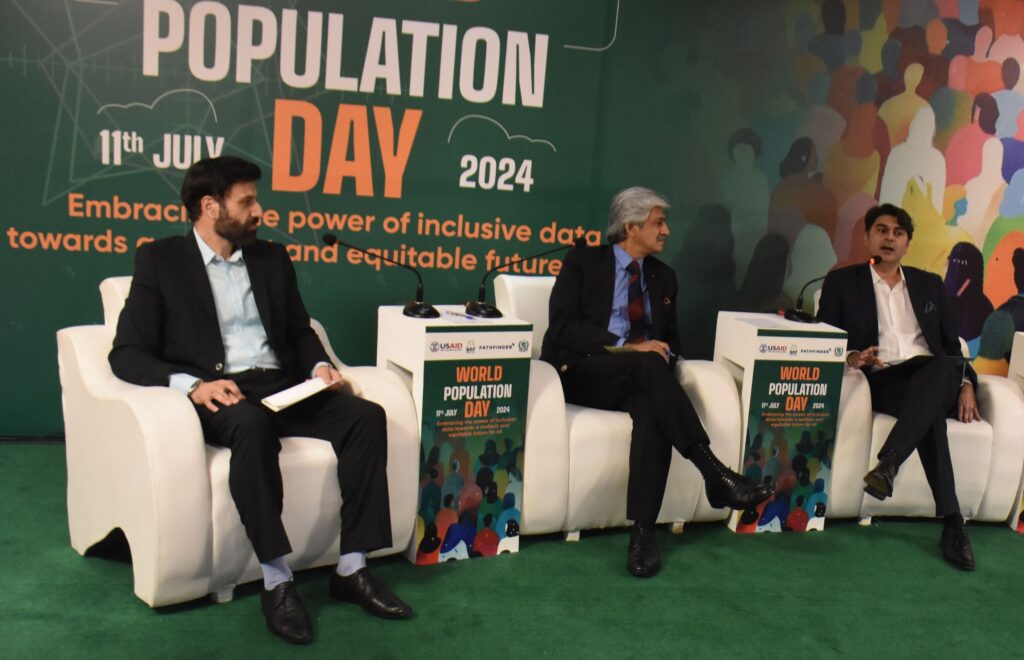
Islamabad : Ministry of National Health Services, Regulations and Coordination (M/o NHSR&C) has observed the World Population Day on 11th July this year, to raise awareness of population issues and promote solutions that guide towards a sustainable future. The theme of this year’s World Population Day is “Embracing the power of inclusive data towards a resilient and equitable future for all”.
The seminar was organized by Ministry of Health Services, Regulations and Coordination, The seminar was attended by the federal and provincial ministers , diplomats, implementing partners, representatives of NGOs & INGOs, development partners and media persons.
The Coordinator to Prime Minister on National Health Services Regulation and Coordination, Dr. Mukhtar Malik, graced the occasion as Chief Guest. Dr. Mukhtar Ahmad, said that World Population Day is dedicated to raising awareness of population issues and promoting solutions that guide us towards a sustainable future. This year’s theme, “Embracing the power of inclusive data towards a resilient and equitable future for all,” underscores the critical role of comprehensive and accessible data in shaping effective population policies. It is a call to action to harness the power of data, to include diverse demographics and socioeconomic factors in our analysis, and to create strategies that address the needs of all segments of our society.

The Federal Secretary for Health, Nadeem Mahbub, addressing the seminar, emphasized that in view of the challenges and opportunities presented by our growing population, it is important to acknowledge the significant strides we have made. Under the National Action Plan, the establishment of federal and provincial task forces on population reflects the highest-level commitment to population management. Other important achievements include expansion of family planning service delivery by bringing health departments on board; and enhanced allocation of funds. National Narrative on Population ‘Tawazun’ reflects Pakistan’s commitment to rights-based voluntary family planning. MoNHSR&C playing its role is revising the existing National Action Plan on Population (2019-24) in consultation with provinces, regions and other stakeholders.
The revised National Action Plan on Population (2025-30) aims to achieve the targets of Contraceptive Prevalence Rate to 60%, total Fertility Rate to 2.2% and Population Growth Rate to 1.1 by the year 2030
Director General (Population Program Wing), Dr. Shabana Saleem, being the host of the seminar welcomed all the participants. She highlighted the role of Population Program Wing of Ministry of Health Services, Regulation and Coordination in coordinating National and International efforts to advance population welfare and development agenda in Pakistan. She said that the Ministry have made significant strides, developed National Action Plan on population (2019-2024) in consultations with provinces, regions and other stakeholders from public and private sectors. Now, we are leading the updating of the National Plan after five year to reflect new ground realities and to meet the targets of contraceptive prevalence rate to 60%, decrease fertility rate to 2.2 and population growth rate to 1.1 by the year of 2030.
Dr. Hafiz Ikram-ul-Haq, Secretory, Council of Islamic Ideology highlighted the National Population Narrative ‘Tawazun’ in the light of Islamic teachings. The concept of Tawazun is ‘Parents have the rights to freely & responsibly decide the number and spacing of their children to fulfill the fundamental rights of their children & family by maintaining a balance between their family size and resources’.
Mr Neil Hawkins, Australian High Commissioner to Pakistan and Dr.Noor Khan,Deputy Head of Mission, Norwegian Embassy, emphasized the international commitment to address the issues concerned with rapidly growing population. Acclaimed Pakistani singer, Shehzad Roy, brand ambassador for population and family planning, addressed the participants and highlighted the importance of population issues.